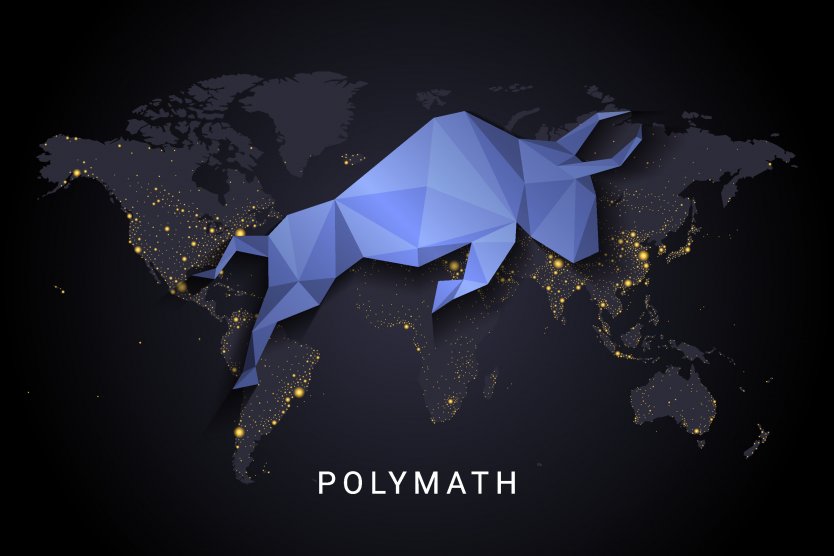An initial public offering, or IPO for short, is one of the ways a business can raise money when it needs to. In this scenario, the business proposes to pay public investors in exchange for cash shares of equity (or company debt).
In the cryptocurrency realm, a business or organization can launch an initial coin offering (ICO) and sell tokens, which are often traded on a decentralized market like Uniswap. Among other limitations, the ICO procedure is frequently more effective in terms of time.
The fact that ICOs are decentralized fundraising operations, nevertheless, means that they are not governed and may get the organization into difficulty. Enter Polymath, which uses the blockchain technology of Ethereum to enable regulated initial public offerings (IPOs) on a decentralized network like Ethereum.
More than just a tool for creating security tokens, Polymath is a learning platform. As a company, Polymath has made significant contributions to the cryptocurrency community and promoted a more controlled method of collecting money through security tokens.
Key takeaways
- With a customizable architecture, Polymath helps organizations and companies with the legal compliance process.
- With its ethereum-based security tokens, Polymath also assists businesses with the issuance of bonds and derivatives.
- The POLY cryptocurrency token is a utility token that is employed to reward and finance the many Polymath blockchain processes, including the payment of fees related to the issuance and administration of security tokens, KYC/AML verifications, and more.
What is Polymath (POLY)?
The company and its patented technology for developing, issuing, and administering digital assets on the Ethereum blockchain are both referred to as Polymath.
Complete compliance with securities regulators that are specific to each country is a step in the creation of the security token.
But Polymath makes compliance simple by providing a uniform but adaptable framework that any developer or business may utilize to satisfy legal requirements.
Additionally, Polymath’s open-source smart contracts, which are likewise auditable by regulators and other relevant parties, contain particular rules for each security token that can be verified. Polymath first contributed to the creation of tokens using its ST20 standard, which is its own standard token architecture.
After 2018, security tokens that adhere to the ERC1400 standard—about which you may read more in the following section—have become more prevalent. The Ethereum-based application developed by Polymath has so far enabled the deployment of over 200 security tokens, which has been quite effective in luring businesses to the platform.
Polymath assists businesses in selling representations of stocks on the blockchain in the safest, most effective manner rather than assisting in the creation of ERC-20 tokens for ICO sales. After all, the sale of shares is a tried-and-true and strictly governed method of funding.
It’s also important to note that Polymath can assist businesses with the issuance of derivatives like futures contracts and bonds.
An ERC-20 token is what?In a nutshell, they are merely assets that are used on the Ethereum blockchain to facilitate the network’s numerous utilities and functionalities.
What is POLY, a cryptocurrency?
The majority of blockchain-based applications include their own utility tokens that are used to reward network users for adhering to the rules and acting honorably. POLY is utilized by all parties participating in the issuance of security tokens, and Polymath is no exception.
POLY is used by the issuer to cover costs related to the development, distribution, and management of security tokens as well as dividends and liquidation procedures.
Investors can also pay for KYC/AML checks with POLY. Finally, network nodes are compensated with POLY for ensuring network security by validating blockchain data.
Issuers must collaborate with “legal delegates” from the Polymath network to create security tokens. Be aware that they work independently as lawyers in the real world and are not paid employees of Polymath.
In order to register the company with the securities regulator, the legal delegates will assist in confirming the company’s identity, accreditation status, and gathering other information.
As previously indicated, investors seeking to purchase stocks or other securities must pay in POLY to have their identity confirmed using accepted KYC and AML processes. Securities may be purchased and sold from verified and accredited investors, but not from unaccredited investors.
Since POLY was designed as an ERC-20 token, it may be safely stored in any Ethereum wallet. The Polymath program allows developers to generate ST20 security tokens using POLY.
One billion POLY tokens were issued; 240 million (or 24%) were airdropped to Polymath participants who signed up by January 10th.
How do ERC1400 tokens work?
It’s significant that Polymath actually launched the ERC1400 standard, which expands on the ST20 standard, into the Ethereum community in 2018.
In an effort to harmonize security tokens across all Ethereum apps, this was done. Other networks besides Polymath have their own standards. For instance, the R-Token was born from the Harbor platform.
The Ethereum community can now develop security tokens that always mandate the involvement of securities regulators as a prerequisite for token creation according to the new ERC1400 standard. Although the tokens were really created as an ERC1400 token, Polymath continues to refer to them by the moniker “ST20” (they are merely different names for the same thing).
Exactly why would a business offer security tokens?
To collect money rapidly and reach a larger audience of investors, ICO is genuinely a desirable method for projects. When used wisely, ICO is the ideal way for blockchain startups to get traction in the market and speed up their growth.
Investors are more inclined to appreciate the ICO token for speculative trades because a monetary value is connected to it at launch. In fact, the majority of the time, ICO tokens that have been sold by legitimate projects have seen a spectacular surge in the market.
Due to exit scams, where the ICO issuer just went off with the money raised, the tokens became worthless, the issue is that not all initiatives are reputable. Even if an ICO is not a hoax, regulators view them as unethical ways for companies and other legal entities to raise money.
The US Securities and Exchange Commission’s legal action against Ripple Labs is one illustration. The claim that XRP coins are being treated as unregistered securities is the basis of the complaint, and the Howey Test identifies XRP as a security.
Whether or whether crypto assets should be subject to the Howey Test is still up for dispute. However, the majority of businesses would prefer not to spend millions of dollars fighting the SEC in court.
introducing smart contracts into the world of people
Polymath cleverly devised a technique to employ smart contracts in a legal framework in order to offer the best of both the crypto and regulated worlds. This implies that the authenticity of a Polymath’s security tokens is supported by both the stamp of legal approval and by hard computer logic.
Companies that want to sell stocks, for instance, must engage with lawyers to confirm their financial standing and register with regulators, all of which are supported by the rule of law. Smart contracts, on the other hand, operate at the transactional level.
With the support of the unchangeable law of code, it is possible to conduct share transactions, IPO sales income, dividend payments, and secondary market trading effectively and with few, if any, middlemen.
A regulated broker can still instruct smart contracts to restrict trading operations, for example, to halt or temporarily cease trading, when the situation warrants. It is crucial to remember that the securities market is a regulated market.
What does Polymath have to offer companies?
The engineers at Polymath assist businesses in creating crypto assets on their behalf through their white label security token development services. Of fact, anyone can produce their own tokens without using the white label service since Polymath is an open-source program.
One of Polymath’s services is called Token Studio; it is referred to as “a self-service application that allows users to create, issue, and manage security tokens through a simple, intuitive interface.” With Polymath’s full-stack platform, developers with no experience in blockchain technology can set the parameters for the token that will be issued.
Companies, legal services, broker-dealers, KYC/AML providers, and custodians can all come together on the Polymath Service Provider Marketplace to exchange services for POLY tokens. The securities issuer will be led by these actual, regulated organizations through the IPO (or other offerings) process.
What does Polymath’s future hold?
According to the Polymath Roadmap, the eagerly awaited Polymesh blockchain network will eventually go live on September 21, 2021, as planned. The standalone blockchain network created by Polymath, called Polymesh, is designed to support smart contracts and the history of all issued security token transactions.
This is not unexpected considering that Ethereum is a general-purpose blockchain where network activities from different decentralized applications may compete for computing resources.
High network fees are the outcome, which is not suitable for businesses, particularly those that are sensitive to slight price changes (such as brokers and exchanges).
The Polymesh blockchain adds still further layer to guarantee legal compliance. There is a certain amount of centralized control in a decentralized network because trading securities could only be done through authorized and regulated brokers.
Confidentiality, a KYC/AML focus, decentralized governance, and a flexible framework that may be used in all jurisdictions are some of the additional advantages it provides.
What are some important lessons to learn now that you are aware of what Polymath (POLY) is?
A project with practical value is Polymath. Many blockchain-based projects have a lot of users and attractive sounds, but many find it difficult to integrate with the regulated world.
Companies are still looking forward to employing services that are compliant after seeing a few companies suffer defeats in a court struggle with securities authorities.
The market for security tokens is growing quickly. According to a forecast, the market would grow to $1.5 trillion by 2024 in just Europe. It will eventually grow to be a large market that cannot be disregarded, but there is still time.









